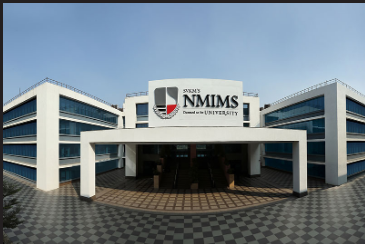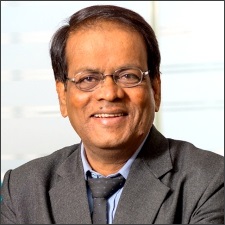
NMIMS Mumbai School of Mathematics Science
NMIMS Deemed-to-be University initially gained prominence by offering programs in Management, earning international recognition as a leading institution for management education. The Sunandan Divatia School of Science (SDSOS) was founded in 2007 with the aim of offering undergraduate and postgraduate students opportunities to pursue academic careers in the basic sciences. The school was established to foster a strong foundation in scientific disciplines, combining academic rigor with industry-relevant training, and preparing students for successful careers in science and research. Over the years, SDSOS has seen significant growth across multiple dimensions, including student enrollment and graduation rates, faculty recruitment and retention, research publications, patent registrations, and successful student placements in both academia and industry. In recent years, the school expanded its offerings by launching new undergraduate B.Sc. programs in cutting-edge fields like Data Science, Artificial Intelligence, Applied Psychology, Animation, and VFX.
As part of a strategic initiative, NMIMS leadership merged the School of Mathematical Sciences with the five programs from the Department of Statistics under SDSOS. This restructuring led to the creation of the Nilkamal School of Mathematics, Applied Statistics, and Analytics (NSOMASA), a new school dedicated to these evolving disciplines.
Courses
Highlights
|
Quick View of NMIMS Mumbai School of Mathematics Science |
|
|
College Type |
Private |
|
Location |
Mumbai |
|
Accepted Exam |
SAT India, ACT, NMIMS, Online Entrance Test |
|
Recognised By |
UGC |
|
Course |
B.sc |
|
Total Course |
2 |
NMIMS Mumbai School of Mathematics Science Courses
The NMIMS Mumbai School of Mathematics Science Courses refers to the academic programs offered by the school, focusing on mathematics, statistics, and related scientific disciplines. These courses are designed to provide students with a deep understanding of mathematical concepts, statistical analysis, and their applications across various fields.
1. Undergraduate Programs: Bachelor’s degrees such as B.Sc. in Mathematics, Applied Statistics, Data Science, and other related fields that build foundational knowledge in mathematical and scientific theories and practices.
2. Postgraduate Programs: Master’s programs (M.Sc.) in advanced topics like Applied Mathematics, Statistics, Data Analytics, and similar areas. These programs delve deeper into specialized areas of mathematics and science, preparing students for careers in academia, research, or industry.
Bachelors Programs
- B. Sc. (Applied Statistics & Analytics)
- B. Sc. (Data Science)
Masters Programs
- M.Sc. Applied Statistics & Analytics
- M.Sc. Statistics & Data Science
- M.Sc. Data Science
NMIMS Mumbai School of Mathematics Science Admission
Admission to the NMIMS School of Mathematical Sciences' BSc (Hons) in Mathematics programme is determined by an Essay Writing and Online Entrance Test administered by NMIMS Mumbai. The following are further details about the NMIMS School of Mathematical Sciences admissions process:
- Candidates are chosen based on their performance in Class 10 (in the discipline of Math), scores in Essay Writing, and performance in the Online Entrance Test.
- The school publishes two merit lists containing the names of the individuals who have been shortlisted.
- Candidates beyond the age of 25 are ineligible to apply.
- For admission to this programme, NMIMS Mumbai's School of Mathematical Sciences now accepts SAT and ACT scores. When registering for the exam, candidates must include their institute code/ DI code. When registering for the SAT exam, the code is 7511.
How to apply ?
Step 1: To register online, go to the institute's official website.
Step 2: Go to ‘Click here to Apply' and fill out the form.
Step 3: Complete the application form and attach any necessary documents.
Step 4: Pay the INR 1,000 application cost online (by debit card, credit card, or net transfer).
NMIMS Mumbai School of Mathematics Science Selection Criteria
The following formula will be used to compute the merit score:
- The weighted average of a candidate's Mathematics percentage in Class XII will be 50 percent, followed by 25 percent for Mathematics percentage in Class X and aggregate percentage in Class XII.
- Candidates must update their personal information in the online application form before the registration deadline. After the registration period has ended, no scores will be accepted. If a candidate fails to update their information, they will not be considered for the merit list. It is the candidate's entire obligation to ensure that the correct scores are submitted into the online form. As significant dates approach, the Merit List will be posted on the NMIMS website. In this case, the institute's judgement will be final, and no further inquiries or contact will be accepted.
- Admission is offered based on merit and vacancies. Candidates who have been chosen should pay their fees as soon as possible, according to the deadlines.
- Candidates on the waiting list should verify their position on the merit list on a frequent basis.
NMIMS Mumbai School of Mathematics Science Eligibility
|
Courses |
Duration |
Eligibility |
|
B.Sc. (Applied Statistics & Analytics) |
4 years |
Candidate must have passed 10 + 2 or equivalent examination with Mathematics/ Mathematics & Statistics as compulsory subject with minimum 50% aggregate marks in any stream (Science/Commerce/Arts with Mathematics/ Mathematics & Statistics). |
|
B.Sc. (Data Science) |
4 years |
Candidate must have passed 10 + 2 or equivalent examination with Mathematics/ Mathematics & Statistics as compulsory subject with minimum 50% aggregate marks in any stream (Science/Commerce/Arts with Mathematics/ Mathematics & Statistics). |
|
M.Sc. (Applied Statistics & Analytics) |
2 years |
Candidate must hold a Bachelor’s degree in Statistics from any recognized University / institute with a minimum of 50% aggregate marks or equivalent grade |
|
M.Sc. (Statistics & Data Science) |
2 years |
Candidate must hold a Bachelor’s degree in Statistics from any recognized University / institute with a minimum of 50% aggregate marks or equivalent grade |
|
M.Sc. (Data Science) |
2 years |
Candidate must hold a Bachelor of Computer Application (B.C.A.) with minimum 50% aggregate marks or equivalent grade. |
NMIMS Mumbai School of Mathematics Science Fees
The Nilkamal School of Mathematics, Applied Statistics & Analytics (SoMASA) at NMIMS Mumbai offers undergraduate and postgraduate programs in mathematical sciences.
|
Course |
Duration |
Fees |
|
B.Sc. (Applied Mathematical Computing) |
4 Years |
1,50,000 |
|
B. Sc. (Applied Statistics & Analytics) |
4 Years |
2,25,000 |
|
B. Sc. (Data Science) |
4 Years |
1,52,000 |
|
M.Sc. Applied Statistics & Analytics |
2 Years |
2,50,000 |
|
M.Sc. Statistics & Data Science |
2 Years |
2,50,000 |
|
M.Sc. Data Science |
2 Years |
2,00,000 |
NMIMS Mumbai School of Mathematics Science Review
|
Placements |
3.6 |
|
Faculty & Course Curriculum |
4.1 |
|
Infrastructure |
3.6 |
|
Value for Money |
4.2 |
|
Crowd & Campus Life |
3.7 |
NMIMS Mumbai School of Mathematics Science Ranking
- 2nd Best among NIRF ranked colleges in Maharashtra in 2020
- 2nd Best among The Week ranked colleges in Maharashtra in 2020
NMIMS Mumbai School of Mathematics Science Placement
The Nilkamal School of Mathematics, Applied Statistics & Analytics (SoMASA) at NMIMS Mumbai offers undergraduate and postgraduate programs in mathematical sciences.
|
Particular |
Detail |
|
Highest Salary |
18.42 LPA |
|
Average Salary |
11LPA |
|
Median salary |
10 LPA |
NMIMS Mumbai School of Mathematics Science Recruiters
Faculty (10)
';|
S.no |
Faculty |
|
1. |
Dr. Sushil Kulkarni Professor & Dean NSOMASA |
|
2. |
Dr. Leena Kulkarni Dr. Leena Kulkarni Assistant Professor |
|
3. |
Dr. Pradnya Khandeparkar Dr. Pradnya Khandeparkar Associate Professor |
|
4. |
Dr.Rushina Singhi, Dr.Rushina Singhi, Associate Professor |
|
5. |
Shraddha Sarode Shraddha Sarode Assistant Professor |
|
6. |
Prof. Sunil Shirvaiker Prof. Sunil Shirvaiker Prog Director (Stats) & Associate Professor |
|
7. |
Dr. Debasmita Mukherjee Dr. Debasmita Mukherjee Assistant Professor |
|
8. |
Dr. Shikha Gaur Dr. Shikha Gaur Assistant Professor |
|
9. |
Dr. Kavita Jain Dr. Kavita Jain Assistant Professor |
|
10. |
Dr. Ritu Dhankhar Dr. Ritu Dhankhar Assistant Professor |
Facilities

AC Classrooms

Auditorium

Banks Facilities

Convenience Store

Cafeteria

Hostel

Wi-Fi Campus

Sports Complex

Shuttle Service

Medical Facilities
Events
Contact
V. L, Pherozeshah Mehta Rd, Vile Parle West, Mumbai, Maharashtra 400056
mayank.vahia@nmims.edu
-
PGDM-Post Graduate Diploma in Management
Total Fee: INR 745000
-
B.Com Bachelor of Commerce
Total Fee: INR 240000
-
PGDM-Post Graduate Diploma in Management
Total Fee: INR 745000
-
B.Com Bachelor of Commerce
Total Fee: INR 240000
-
PGDM-Post Graduate Diploma in Management
Total Fee: INR 745000
-
B.Com Bachelor of Commerce
Total Fee: INR 240000
-
PGDM-Post Graduate Diploma in Management
Total Fee: INR 745000
-
B.Com Bachelor of Commerce
Total Fee: INR 240000
Highlights
- International Institute of Business Studies (IIBS) is an AICTE Approved college which is recognized by Ministry of HRD, Government of Indias
- IIBS rated India’s No.1 emerging B-School in placement by Samaja Parivarthana
- Faculty of IIBS consists of experienced corporate faculty with 65% Ph.D. holders
- Ranked 2nd among 'Top 10 Southern B Schools' by Silicon India, 2017
- Ranked 3rd in Placement among the Best B-School in India 2017 by Silicon India
Modern Facilities
- Smart Classroom: IIBS provides fully equipped classroom with air-conditioned, projectors, remote controlled LCD and high speed connected computers and cordless microphones
- Library: It is fully equipped by highly information recourses like latest periodicals, reference texts, management text books, national and international journals and DVDs and well organized
- Digital Library: Students of IIBS can be access the digital library through any computers by using their ID and password
- Auditorium: IIBS auditorium is fully furnished and laced with all modern devices to more impactful view
- Hostel: IIBS provides hostel accommodation for boys and girls with mesh facility
Conducting IIMs have been changed the pattern of the CAT exams several times over the years. It is extremely beneficial for the aspirants to know the CAT paper pattern as it helps in preparation and the aspirants can prepare according to the pattern and weightage of the topics.
Overview of the Exam Pattern of CAT 2020
| Mode of the Exam | Online Only |
|---|---|
| Total number of Questions | 100 |
| Total Marks | 300 |
| Duration of the Examination | 3 hours (180 minutes) |
| Sectional Division of the Paper | 3 sections |
| Types of the Questions | Both MCQs and Non MCQs |
| Marking Scheme |
For Correct Answers → +3 marks For Incorrect Answers → -1 mark For Unattempted Questions → No marks |
| Name of the Sections |
1. Verbal Ability & Reading Comprehension 2. Logical Reasoning & Data Interpretation 3. Quantitative Aptitude |
This Exam is conducted once in a year usually in the month of November on online mode and it is expected that this year this exam will held in the last week of November. The question paper contains 100 questions to be solved in 3 hours. 3 marks are assigned for correct answer and 1 mark is deducted for wrong answer in CAT Exam. English is the only medium of answering the questions. Each question consists of four choices from which only one is correct, candidates have to select the right answer from the given options.
CAT question paper consists of three sections divided as
- 1. Verbal and Reading Comprehension (VARC)
- 2. Data Interpretation & Logical Reasoning (DI & LR)
- 3. Quantitative Ability (QA)
Overview of the Exam Pattern of CAT 2020
| Section’s Name | Number of Questions | Duration (in mins) |
|---|---|---|
| Verbal and Reading Comprehension (VARC) | 34 | 60 |
| Data Interpretation & Logical Reasoning (DI & LR) |
VA → 10 Questions RC → 24 Questions |
60 |
| Quantitative Ability (QA) |
DI → 16 Questions LR → 16 Questions |
60 |
| Total | 100 | 180 minutes (3hours) |
Verbal Ability and Reading Comprehension Section
This section is a combination of two sub-sections namely Verbal Ability (VA) and Reading Comprehension (RC). The main focus of this section is on the English language skills of the candidates and how they understand and elucidate the paragraphs and Passages. This section consists of 34 questions, 10 questions of Verbal Ability and 24 questions of Reading Comprehension. Verbal ability sub-section consists of questions related to Para-jumbles, Summary based questions, Sentence Correction and Completion. The other sub-section, Reading Comprehension is based on the questions related to Vocabulary, title etc.
Logical Reasoning & Data Interpretation Section
This section is also divided into two sub-sections, one is Logical Reasoning (LR) and other is Data Interpretation (DI). A total of 32 questions are asked in this section, 16 questions from both the sub-section. LR section contains solvable questions generally from the topics like inequalities, symbol operations, direction sense test etc. On the other hand DI section is a little difficult and time-consuming section as it consists of several confusing data case lets questions. This section contains tricky question and a little mistake in understanding the case lets can lead the candidates to attempt all the questions from a particular set incorrectly.
Quantitative Aptitude Section
This section is a standalone section which comprises only numerical questions from different topics of Math. A total of 34 questions are asked in this section. This section contains questions based on Basic Arithmetic, Number System, Geometry, Algebra, Modern Math etc. The questions in this section ranges from easy to moderately high and can be answered easily with proper practice of the syllabus of Quantitative Aptitude.

|
Prof. Prabhakar H
B.Sc., PG in HRD, PG in Training & Development |

|
Prof. Prabhakar H
B.Sc., PG in HRD, PG in Training & Development |

|
Prof. Prabhakar H
B.Sc., PG in HRD, PG in Training & Development |

|
Prof. Prabhakar H
B.Sc., PG in HRD, PG in Training & Development |

|
Prof. Prabhakar H
B.Sc., PG in HRD, PG in Training & Development |

|
Prof. Prabhakar H
B.Sc., PG in HRD, PG in Training & Development |
Facilities













CAT 2020 will be conducted in the following cities:
| Port Blair | Kurnool | Nellore | Tirupati |
| Vijaywada | Visakhapatnam | Chittoor | Itanagar |
| Dibrugarh | Guwahati | Silchara | Aurangabad |
| Gaya | Muzaffarpur | Patna | Chandigarh |
| lorem | lorem | lorem | lorem |
Contact Us
#75, Muthugadahalli, Bangalore North Jala Hobli, near International Airport airport(New Airport), Bangalore ( Karnataka)
admission@iibsonline.com









